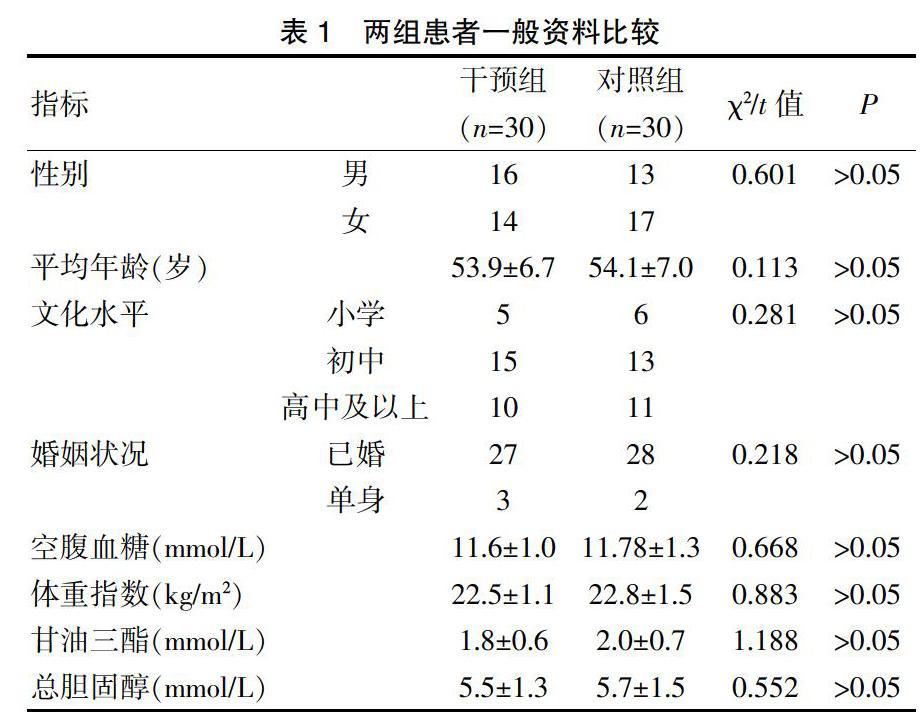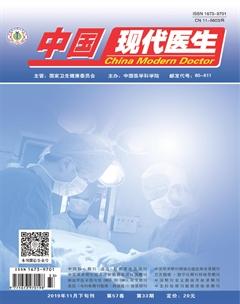护理干预对2型糖尿病患者自我护理能力及生活质量的影响
王斌


[摘要] 目的 探讨护理干预对2型糖尿病患者自我护理能力及生活质量的影响。 方法 选择2018年7~12月在我院诊断治疗的2型糖尿病患者60例为研究对象,随机分为干预组与对照组,各30例。对照组给予常规处理,干预组给予针对性护理干预。分别于干预前及干预后1个月采用自我管理量表对患者自我护理能力进行评价,采用SF-36量表对患者生活质量进行评价,比较两组干预前及干预后1个月自我护理能力、生活质量。 结果 干预后两组自我护理能力均显著提高,与干预前比较,差异有统计学意义(P<0.05);干预后,干预组自我护理能力显著高于对照组,差异有统计学意义(P<0.05)。干预后,两组SF-36各维度得分均显著高于干预前,差异有统计学意义(P<0.05);干预后,干预组SF-36评分显著高于对照组,差异有统计学意义(P<0.05)。 结论 护理干预能够显著提高2型糖尿病患者的自我护理能力,改善患者生活质量。
[关键词] 护理干预;2型糖尿病;自我护理能力;生活质量
[中图分类号] R473.5 [文献标识码] B [文章编号] 1673-9701(2019)33-0146-04
[Abstract] Objective To explore the effect of nursing intervention on self-nursing ability and quality of life in patients with type 2 diabetes. Methods A total of 60 patients with type 2 diabetes diagnosed and treated in our hospital from July to December 2018 were enrolled in the study. They were randomly divided into intervention group and control group, with 30 cases in each group. The control group was given routine treatment and the intervention group was given targeted nursing intervention. The self-management scale was used to evaluate self-nursing ability, and the SF-36 scale was used to evaluate the patient's quality of life before and after 1 month of the intervention. The self-nursing ability and quality of life before and after the intervention were compared between the two groups. Results After the intervention, the self-nurising ability of the two groups was significantly improved, and the difference was statistically significant (P<0.05). After the intervention, the self-care ability of the intervention group was significantly higher than that of the control group, and the difference was statistically significant(P<0.05). After the intervention, the scores of SF-36 in each dimension were significantly higher than those before intervention, and the difference was statistically significant(P<0.05). After the intervention, the SF-36 score of the intervention group was significantly higher than that of the control group, and the difference was statistically significant(P<0.05). Conclusion Nursing intervention can significantly improve the self-nursing ability of patients with type 2 diabetes and improve their quality of life.
[Key words] Nursing intervention; Type 2 diabetes; Self-care ability; Quality of life
中國是全球糖尿病患病人数最多的国家,过去30年,中国糖尿病患病率急剧增加,从1980年的不到1%,到2013年的10.9%,老年人、男性、城市居民、经济发达地区居民、超重、肥胖者是高发人群[1,2]。环境因素,包括患者饮食模式、生活方式是糖尿病重要的危险因素。因此,患者良好的自我护理能力有利于患者执行健康饮食模式,改善生活方式,进而提高糖尿病控制水平,提高生活质量[3,4]。护理干预是基于一定科学理论,在护理诊断的指导下,按事先预定的干预方法从事的一系列护理活动[5,6]。患者的健康决定干预类型,干预措施有助于帮助患者达到预定目标,促进康复,预防并发症发生。本研究对2型糖尿病患者实施护理干预,观察患者自我护理能力及生活质量的改善情况,以期为临床护理提供参考。
综上所述,护理干预能够显著提高2型糖尿病患者的自我护理能力,改善患者生活质量。
[参考文献]
[1] 張波,杨文英. 中国糖尿病流行病学及预防展望[J].中华糖尿病杂志,2019,11(1):7-10.
[2] 朱大龙. 十年磨一剑:中国糖尿病研究进展及思考(Ⅰ)[J]. 中华糖尿病杂志,2019,11(1):1-6.
[3] 赵子煜,高志娟,陆嘉燕,等. 目视健康管理对2型糖尿病患者自我管理能力及行为的影响研究[J]. 中国全科医学,2019,22(13):1603-1607.
[4] 王思琛,张正平,胡丽茎,等. 2型糖尿病职场工作者的自我效能与情绪困扰的相关性[J]. 护理研究,2019,33(7):1240-1243.
[5] 卢璐璐,陈琼妮,罗碧华. 正念干预应用于糖尿病患者管理的研究进展[J]. 中国护理管理,2019,19(1):128-132.
[6] 刘宇飞,李闺臣,华珊珊,等. 问题解决疗法在国外糖尿病病人中的研究进展[J].护理研究,2019,33(7):1153-1157.
[7] 葛均波,徐永健. 内科学[M]. 第8版. 北京:人民卫生出版社, 2013:733.
[8] 李超群. 糖尿病患者自我管理量表的汉化及信效度评价[D]. 河北大学,2018.
[9] Ware JE,Sherbourne CD. The MOS 36-item short-from health survery(SF-36):Conceptual framework and item selection[J]. Medical Care,1992,(30):473.
[10] 芦燕,芦莉. 饮食护理干预对糖尿病肾病病人饮食治疗依从性及营养状况的影响[J]. 首都食品与医药,2019, 26(2):135.
[11] 林伟,梅阳阳,林丽娜. 延续护理干预对糖尿病足患者自我管理能力的影响[J]. 广西中医药大学学报,2019, 22(1):91-94.
[12] 卢璐璐,陈琼妮,罗碧华. 正念干预应用于糖尿病患者管理的研究进展[J]. 中国护理管理,2019,19(1):128-132.
[13] 施燕丽. 护理干预用于ICU内高血压合并糖尿病患者效果分析[J].糖尿病新世界,2019,22(5):125-126.
[14] 韩云梅. 整体护理干预在妊娠期糖尿病患者中的应用观察[J]. 中国药物与临床,2019,19(3):519-521.
[15] 韩雪. 全程护理干预对冠心病合并糖尿病患者的效果观察[J]. 糖尿病新世界,2019,22(5):142-143.
(收稿日期:2019-08-07)

